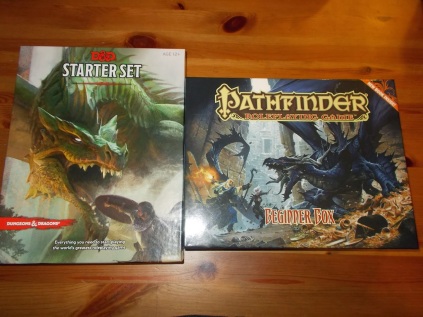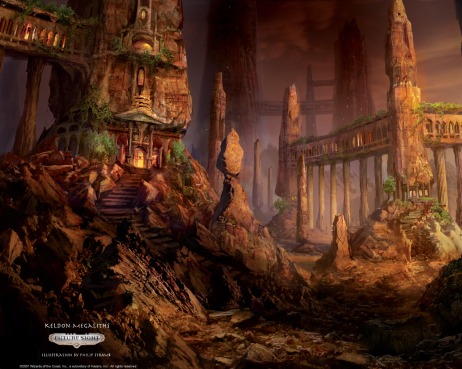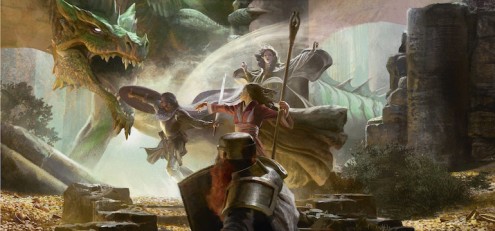Welcome to your first role playing game experience. I shall be your host, the Dungeon Master, and as you are my guests, the players, I will do my best to take you through a journey of the mind that will give you memories that last a lifetime. This will not be a cakewalk, nor will it be impossible. Keep your wits sharp about you and your sense of adventure always on high, and I will make sure you have a great time. I see you are equipped with your favorite set of dice, your characters, and a pencil, so without further ado, lean forward to the edge of your seats as we embark together on the unknown. The game has begun!
There are times I look back to when I first learned how to play a roleplaying game. The concept initially was a little unusual for me because it was tough for me to understand I could do basically anything in the game. There was no true ending to a game like the board games I had played before. We worked together in teams with various abilities and skills that let us overcome amazing obstacles. But we were just in charge of our own characters’ action, not the game itself as my mom thought the one and only time I talked her into playing (she thought her dwarf automatically found 16 gold coins by walking under the tables of a tavern just because that’s what she did).
I was fortunate enough to have someone sit down with me and explain the rules of 2nd edition Advanced Dungeons & Dragons when I was about 11 or 12 years old (although looking back, there was some considerable misunderstanding of the rules from my tutor). I was given the general idea of the rules, explaining the difference between Intelligence and Wisdom. Combat was a bit challenging to understand what ThAC0 was, which I changed the word to simply “Fighting.” But there still was a lot of guess work that I had to make in order to run the game. I didn’t quite have the attention span to read an entire Player’s or Dungeon Master’s rulebook. I was too anxious to get started. Ironically I never played in a game with my tutor. My first game I ever participated in was me being the DM. In fact, it wasn’t until I was 15 before I sat down as a player, which turned out to be a disaster I’ll tell about in a moment.
Granted I was very lucky in that someone who was somewhat knowledgeable with RPGs was around about the time I was old enough to start playing. For those who are unfamiliar with the game but have always wanted to get started, this article is for you. Here are the basics to know:
DICE
Do you really need that many dice to play the game? I’m sure you have seen players dump their Crown Royal bag o’ dice onto the table at a convention, select the 5-7 dice they need, and then slowly refill the bag of the rejects. Since dice come in so many shapes, sizes, and colors, it is no wonder people enjoy collecting them. There are some dice people will call “lucky” as they seem to roll more satisfying results. There are those who will roll poorly with one die numerous times, put it back in their bag and grab a new one as if it will magically do better. I’m not going to talk about mumbo jumbo hoodoo or mojo dice because, honestly, I don’t believe in it. There are dice that have more worn down edges, which make them roll a little easier than the sharp-edged dice you see in the casino or with Game Science, but we are talking just dice in general here.
The number of dice you need will solely depend on the game you choose to play. Shadowrun, for example, uses large pools of D6 (6-sided) dice while modern editions of Dungeons & Dragons mostly use a D20 for the majority of rolls, leaving the rest to determining damage amount. Although there are random variants, such as a D30 die, traditionally you can feel safe to purchase one each of a D4, D6, D8, D12, and D20. You might only need one D10, but there are times when you need to roll what is called a percentile dice, or D100 (sometimes referred to as D%), in which you will need two D10s. One of these dice should be a different color to easily identify the number to represent the “tens” place and the other for the “ones” placement (6 as the tens and 4 as the ones, for example, would be 64). There are specially marked D10s that have 10, 20, 30, etc. instead of single digits to help eliminate the need to assign either dice a certain role. FYI, if you roll either two 0s or a 00 and 0, this results in a roll of a 100.
So really, you only need a maximum of 7 dice assuming the rule utilizes the entire set. Even more, if you ever go to a convention to play, don’t worry about buying dice when you are first seeing if you like roleplaying games. I guarantee you my life savings of $0.53 that you will always be seated at a table with people who have dice. They will be more than willing to share. Sometimes you will ask “Does anyone have dice I can borrow?” to which you will have literally handfuls of dice tossed at you from everyone. Buy your dice after your first couple of games so you aren’t investing in something you aren’t too wild on.
KNOWLEDGE OF THE RULES
This rulebook is HUGE! Do I really need to know all of the rules to play? Not if you’re playing you don’t. Generally the rules master should be the GM as the players need to concentrate on their own character only. You don’t need to know that it will be a -4 penalty on your roll to leap from the balcony onto the chandelier. That’s the GMs job, and he will let you know prior to making the attempt. They will lay out the risks for your actions generally before you do them if they are risky to begin with. The GM isn’t going to point out “Well you could walk across the tavern to buy a beer, but it’s going to be a guarantee you won’t have any problems walking.” Nine times out of ten, your choice of action is going to be okay with the GM. Look for traps, slay the monster, open the door, loot the chest, talk to the guy, ride off on the horse, set up a look out, head down to the arena, etc., will all be acts that might have consequences but aren’t risky. Things such as hiding from someone, picking someone’s pocket, backstabbing someone, shooting someone in the head, etc., will be explained if need be by the GM before you roll dice. Regardless of the risk of these actions, you need not know the rules of any of the games in order to play your character. Only having an idea of how you want to play your character is all you have to know. The rest is up to the GM. Sit back and enjoy the storytelling by your GM, pipe up when you have an idea of what you want your character to do, and interact with your fellow characters.
It is worth noting, however, that you should not ignore the rules being used entirely when they come up. For example, if the process of combat involves you rolling dice and adding a number from your character sheet to that result when you use your sword, remember that and do so in future encounters to help keep the pace going. If the GM repeats himself/herself to you on things you can or cannot do, don’t continue bringing them up and be mindful of the limitations, if any.
CREATE A CHARACTER THAT EXCITES YOU
The movies and books we love most generally have something to do with the characters within them. Stories with characters that aren’t interesting or are unappealing tend to be forgotten. The most powerful ability you have as a player when sitting down for the first time to play an RPG is the character’s creation process. You don’t really need to know the rules in full here either as the GM should be able to help provide suggestions based upon your initial concept. This concept is key. If you have the time or inspiration, it behooves you to put as much time as you can into the character, down to the littlest idiosyncrasies such as his allergy to wheat or his recent loss of his father to an unknown disease. Think about how that person acts not just overall but to specific situations such as when he is ostracized by the villagers the party just arrived in or when around snotty nobles who look down upon him. Think of how he feels about each of the other characters in the group. Likes, dislikes, quirks that drive him crazy, random pet peeves, etc.
Then begin creating their backstory. If you have a good GM, they are going to not only thank you for this but also utilize unanswered segments in the story in the actual campaign you’re about to play. Talk about your character’s family. Siblings, parents, uncles. Are they alive or dead? What did they do when they were around? Did any of them have noteworthy lives? What is your relationship with them? Did you inherit anything?
When coming up with all of these answers, keep asking yourself if you like the idea. If you are forcing yourself to fill in gaps, stop. Back up and refresh yourself on that area by approaching it another way. If you have to come up with a good idea why your father is no longer living but can’t think of anything good, begin thinking of movies that you enjoyed. Think of the ones that had a death in it of a noteworthy character like Obi-Wan from Star Wars. Think about why his death was so appealing to you. Let your mind wander for a moment with that thought, maybe to other films with similar scenes. Sooner or later your mind will start concocting the ideas you were looking for. You just have to give it some fuel to work on. Movies are always a good place to start.
FIND A GOOD GROUP OF PEOPLE TO PLAY WITH
Quite possibly the most challenging thing even if you have tons of friends who are eager to play. Finding the right group that gels could be written up in a blog all by itself. It isn’t the easiest thing to have 3 or 4 others who A) have the same free night to play regularly, B) keeps interested for the long run of a campaign, C) works well with others, D) isn’t a rules lawyer, E) isn’t bossy. Some people are just so used to their behaviors they fail to see they are affecting others. This is the case when you have a player who wishes to be the center of all attention during a game because he thinks he is funny and “knows best.” It can be problematic at best.
Sometimes even the group of your best friends are not the right group to play an RPG with because the things you generally do together doesn’t involve working as a team. Usually you’re out to the movies, going to dinner, having some drinks, playing video games, enjoying a round of golf, etc. So don’t be upset if your ideal team turns out to be a group of total strangers.
Just about every city that isn’t a one-horse town has a gaming store within driving distance. If I am looking for players, I will go there and either see if I can leave my contact info on the bulletin board if they have one, or I will ask the owner what day their business days are and show up with what I need to play. If you are a GM, finding a group is a lot easier because everyone can play the game; few can run it. I will set up my GM Screen, lay out the books from the rule system I’m running, and even put a sign up inviting newcomers. If I see anyone look my way, I’ll gesture them over to talk about the game in general and size them up on how interested they really are. As a player, I would hover around game sessions as the store, always making note of those with either 3 or 4 in a group as sometimes GMs will allow it to get up to 5 players. Don’t interrupt their game, be super respectful and just watch how they play. Pay attention to their actions. If they are spouting rules back and forth and arguing a lot, you probably shouldn’t try to join them. After the game or during their break, introduce yourself and be point blank asking if they are looking for an extra player in the game. When joining a game in “campaign progress,” you might be limited severely on the character you can pick because others have already been chosen, and their choice comes first unless duplicate classes are allowed. So be flexible. This is your first time. Also be sure to point out it will be your first time playing so they understand you aren’t a moron when you sit down and begin fumbling around with your papers and dice.
On the flipside of in-person, finding groups online is much easier although it is much tougher to hold them together in the long run. There’s a likelihood of time zone conflicting or loss of attention during game play since no one is sitting together to interact with. Having just audio only without anything, even each other, to look at sometimes causes our mind to drift. We also have the temptation to surf the Internet or play a computer game while we are just sitting at our computer. However, despite the possibilities, there are forums galore to post on that can allow you to connect with fellow like-minded players. The website, Reddit, offers discussion pages that bring players together. Again, it falls back to finding the right group of people. Don’t jump on the first wrangled players just because you found a group because they may not be as motivated as you to go the distance or enjoy your style of play. Be selective like you’re buying a car because you’re going to be with these guys regularly for a while.
KEEP CALM AND GAME ON
When I sat down for my first game to play ever, I was 15, and it was at Def Con 3, a convention that ran for about 4 years in Tulsa, Oklahoma. I was given a pre-made character, the Cleric, in a traditional 2nd edition AD&D game. I felt I was comfortable enough, and I was eager to play a “real” game as I had been running games with my friends for a few years. I had no idea I had made up so many house rules for the system until that day. For example, I would let magic-users and clerics cast their list of spells however many times per day they felt. Not knowing it was a one-use and gone system, I chose 1 cure light wounds spell among my 3 for the day. When I had announced I had only picked the one about 1 hour into the game session, I remember everyone at the table in unison yell, “JUST ONE?!” followed by a series of “Oh my god!” “We’re all dead!” “How could you be so stupid?”
Naturally I was a bit upset at the realization that I had apparently jeopardized the safety of the group, but I was also mystified how much I really didn’t understand the rules. Naturally after that day, I read through the entire PHB and DMG and began my addiction of memorizing 100s of rulebooks for the next couple decades.
The point is that we all have to start somewhere. We all have to learn anything in life. No one begins as an expert at something. So don’t let others try to badger you because you don’t know the rules. Explain up front you have never played before, and 9 times out of 10 you will be welcomed with open arms and will see enthusiasm from the others in helping you learn the game. Generally we are passionate about playing RPGs, and we are delighted when we see newcomers wanting to learn because it means more interest and more life in the industry. If you don’t like the particular game you play, try another one because the rules vary greatly among them all. Try going to a convention and purposely sign up for a different game in each slot so you can sample them all. It will give you the quickest and easiest way to tell if you are really interested in getting into this incredibly rich and imaginative world of role playing games. Game on.
Until next time, lie about your dice roll as much as you can get away with. Thanks for stopping by.









